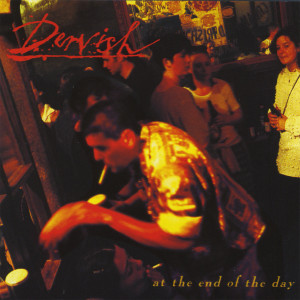 Brendan Foreman penn this review.
Brendan Foreman penn this review.
By the time they recorded end of the day, Dervish had honed its sound to a rather fine edge. It is clear that years of playing have paid off, resulting in nuanced, even stately ensemble-playing. Their first two CDs were not rough by any means, but there was a sense that they were still learning how best to utilize their various musical voices. With the voice and bodhran of Cathy Jordan, the fiddle of Shane McAleer, the flute and whistles of Liam Kelly, Shane Mitchell’s accordion, Michael Holmes’ bouzouki, and Brian McDonagh’s mandolin, guitar, and mandola, Dervish is now a veritable machine of Gaelic minstrely.
Whether it’s the fast and furious pace of the reels in “Touching Cloth” to syncopation of the jigs in “Packie Duignans,” Dervish generates a smooth exposition on at the end of the day that is a pleasure to listen to. One very notable instrumental here is “Josefin’s Waltz,” written and co-played with the Swedish group Vasen. This startling tune combines the icy starkness of the Swedish fiddle playing with the peat-heated warmth of the Irish fiddle. Remarkably, the two styles don’t cancel each other out at all; in fact, they complement each other nicely.
Duignans,” Dervish generates a smooth exposition on at the end of the day that is a pleasure to listen to. One very notable instrumental here is “Josefin’s Waltz,” written and co-played with the Swedish group Vasen. This startling tune combines the icy starkness of the Swedish fiddle playing with the peat-heated warmth of the Irish fiddle. Remarkably, the two styles don’t cancel each other out at all; in fact, they complement each other nicely.
The songs of end of the day are easily as good as they were on the previous two CDs. Cathy Jordan is now in full command of her vocal range, whether she’s singing of a poor man’s love for the aristocratic woman he can never have in “Ar Eirinn Ni Neosfainn Ce Hi (For Ireland I Won’t Tell Her Name)” or of the migrant laborer who enlists in the French Army to make ends meet in “An Spailpin Fanach (The Itinerant Labourer).” One of the most remarkable songs here is “Lone Shanakyle,” a bitter and powerful song written by the exiled poet Thomas Madigan. Over an almost happy air, the narrator recounts the nightmare that was the Potato Blight. There’s a stammering rhythm in the way the words match the backing music, so that the words almost feel like they’re stumbling out of the lyricist’s pen sadly and awkwardly.
Things cheer up a bit with the sprightly “Peata Beag,” a “dandling song” which was sung by a mother as she rocked her child on her knee, and “Sile Ni Ghadra,” in which a woman will have none of the high-falutin’ praise that a passing-by poet gives her.
For some reason, the last song begins with a track called “Thirty Seconds,” which is literally 30 seconds of silence (This could possibly be a shortened cover of a John Cage tune, but I could be mistaken). Nevertheless, “Eileen McMahon” is a gorgeous song, sung a capella by Cathy Jordan. This, like several of the above-mentioned songs, is an Aisling, in which a poet encounters a beautiful woman who symbolizes Ireland in some way.
(Whirling Discs, 1996)
